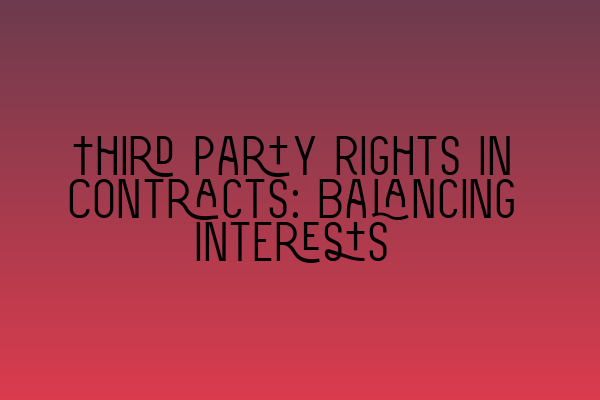**Third Party Rights in Contracts: Balancing Interests**
In the complex realm of contract law, the rights of third parties can often be a contentious issue. When two parties enter into a contract, it is essential to ensure that both their interests are protected and any obligations are appropriately enforced. However, what happens when a third party, who is not a signatory to the contract, possesses legitimate rights and interests that must also be preserved?
This blog post will delve into the concept of third party rights in contracts and explore the delicate balance that must be struck to safeguard the interests of all involved parties.
**Understanding Third Party Rights in Contracts**
Ordinarily, a contract creates rights and obligations solely between the parties who have consented to it. However, there are circumstances where third parties may acquire enforceable rights under the contract or are intended beneficiaries of the contractual obligations. These third parties are neither signatories nor parties to the contract, yet they possess a legitimate interest in its performance.
It is important to note that third party rights can arise explicitly or explicitly within contracts. An explicit third-party right is a legal provision that expressly confers rights on a third party. In contrast, an implicit third-party right occurs when a third party is deemed to have rights due to the intentions of the contracting parties or the nature of the contractual relationship.
**Determining Third Party Rights: Privity of Contract**
To comprehend third party rights fully, one must explore the concept of privity of contract. Privity of contract refers to the legal relationship that exists between the parties who have participated in entering into a contract. Historically, this doctrine provided that only those who were privy to the contract had the right to enforce it or be subjected to its obligations. Consequently, third parties were typically denied the capacity to benefit from or claim against the contract.
However, this traditional approach evolved over time to address the need for greater flexibility in contractual relationships, leading to the emergence of exceptions to the privity rule. These exceptions allow certain third parties to enforce a contract or be bound by its terms, thereby recognizing and protecting their legitimate interests.
**Exceptions to the Privity Rule: Intended and Incidental Third Party Rights**
There are two primary exceptions to the privity rule: intended third party rights and incidental third party rights. Let’s delve into each of these exceptions.
**1. Intended Third Party Rights**
Intended third party rights occur when a contract specifically confers rights on a third party. The parties must have intended to confer the benefits or obligations of the contract directly to the third party. In such cases, the third party can enforce the contract as if they were a party to it.
It is crucial for the contract to contain clear and explicit language regarding the intended third party’s rights. Without precise contractual provisions outlining the third party’s rights, it may prove challenging for them to enforce these rights or claim damages for breach.
**2. Incidental Third Party Rights**
Incidental third party rights arise when a third party indirectly benefits from the contractual obligations but is not the intended beneficiary. While the contract does not expressly confer any rights on these third parties, they may still acquire incidental rights based on various factors, such as the context of the contract or the parties’ intentions.
In contrast to intended third party rights, the ability to enforce incidental rights is often more limited. The third party is reliant on the contracting parties to take legal action to enforce the contract, and they may not have the right to do so directly.
**Balancing the Interests of Parties and Third Parties**
Balancing the interests of parties and third parties in contractual relationships is a delicate task that requires careful consideration. On one hand, parties must ensure that their rights and obligations are adequately protected, and the contract can be enforced. On the other hand, third parties with legitimate interests should not be left without any recourse or protection.
An effective way to strike a balance is by clearly defining the rights and obligations of third parties in the contract itself. Ensuring that the contract explicitly addresses the intended or incidental rights of third parties will provide greater transparency and reduce potential disputes. By doing so, the parties can demonstrate their commitment to fairness and facilitate the smooth execution of the contract.
**Conclusion**
In the intricate landscape of contract law, it is imperative to recognize and address the rights of third parties. Although the privity rule traditionally limited third party participation, exceptions now allow for certain third parties to enforce contracts or be bound by their terms to safeguard their legitimate interests.
By understanding the concept of third party rights, the exceptions to the privity rule, and the need to strike a balance between the interests of parties and third parties, individuals and businesses can navigate the complex world of contractual relationships with confidence and fairness.
If you want to dive deeper into the world of contract law and prepare for your SQE exams, check out these related articles for invaluable resources:
[**SQE 1 Practice Exam Questions**](https://fqps.co.uk/sqe/sqe1-preparation/mcq-practice-quiz) – Test your knowledge with a comprehensive set of practice exam questions for SQE 1.
[**SQE 1 Practice Mocks FLK1 FLK2**](https://fqps.co.uk/sqe/sqe1-preparation/practice-mocks-quiz) – Get hands-on experience with simulated SQE 1 practice mocks for FLK1 and FLK2.
[**SQE 2 Preparation Courses**](https://fqps.co.uk/sqe/sqe2-preparation) – Discover top-notch preparation courses designed to equip you with the knowledge and skills you need to succeed in your SQE 2 exams.
[**SQE 1 Preparation Courses**](https://fqps.co.uk/sqe/sqe1-preparation) – Explore comprehensive SQE 1 preparation courses tailored to help you excel in your exams.
[**SRA SQE Exam Dates**](https://fqps.co.uk/sqe/sqe1-sqe2-exam-dates) – Stay up-to-date with the latest SRA SQE exam dates to plan your study schedule effectively.
